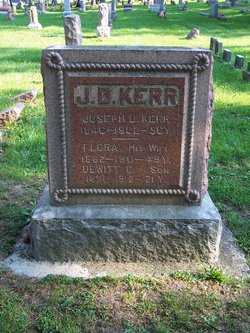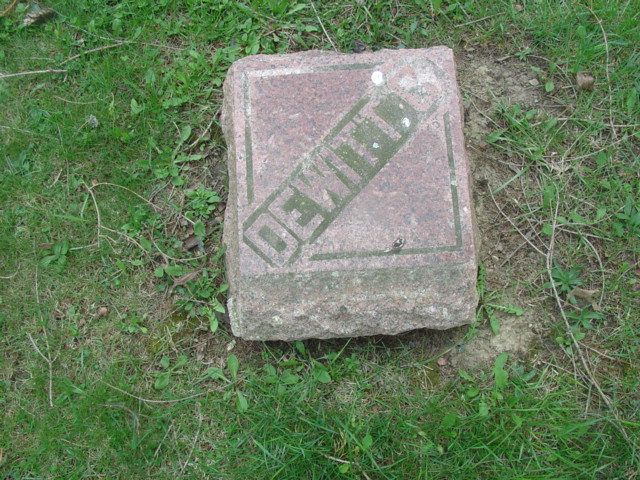The family of Andrew Bostater is one of the earliest families in the area. The Defiance County Express reported on the celebration of the 50th Anniversary of Andrew Bostater and Harriet Cameron Bostater on January 5, 1882. After the party, the unnamed reporter wrote a short history of the family.
"GOLDEN WEDDING
Fifty Years of Married Life Celebrated by a Worthy Couple.
The following interesting account of the wedding of Mr. and Mrs. Andrew Bostater, of Washington township, we take from advance proof sheets of the Bryan Press.
Tuesday, Dec. 20th 1881 was the occasion of a very happy reunion of the children and a few other of the near relatives of Andrew Bostater and Mrs. Harriet Cameron Bostater, at their residence in Washington township, Defiance county, O., that being the 50th anniversary of their marriage.
But for the absence of one son and his family, the joy and felicity of the meeting would have been perfect. Mr. George Bostater, of Lincoln, Neb., found his business relations such that he could not leave home, consequently, his parents, brothers, and sisters were much disappointed in not having the pleasure of meeting one of their number whom they have not seen for nearly ten years.
The guests present were three sons, A. J. Frank and John Bostater and wives and children of the two former; Mrs. Della Bucklew, husband and five children; Mrs. Harriet Ewer, husband and one child; their daughter, Alice, not being present; Mrs. Nanny Ury, husband and one child, and the unmarried daughter, Ella. Besides these, there were present, S. P. Cameron, only living brother of Mrs. B.; Mr.and Mrs. P. S. Gleason, of Bryan, Mrs. G. being youngest sister of Mr.B.; Mrs. Louisa Cameron and Mr. Wm. Strailey.
Guests arrived about 11 a.m., and after greetings, Mr.and Mrs. Gleason, in behalf of the children, presented to each of the parents a very fine upholstered chair, and then, the host and hostess, seated in their new chairs, the oldest son, in behalf of all the children, presented to his father an elegant gold headed cane, and Miss Ella, in behalf of all presented to her mother a beautiful solid gold pin.The presentation of the above gifts were accompanied with a few affectionate and appropriate remarks. In addition to the above joint gifts, many individual gifts were presented, such as Ottomans, slippers, and spectacle cases, gold thimble, gold coins China cups and saucers, gold scarf pins and especially a find gift framed portrait of our late lamented President, James A. Garfield.
After the presentations and a few moments spent in social converse, the children arranged themselves in order of their ages, each with his or her family grouped together in a semi-circle in front of the parents, and then, after a few remarks by the oldest, directing the parents' attention to the fruits of the happy union, fifty years ago, each child and grandchild passed by and kissed the beloved aged couple. Then the eldest daughter escorted the father and the son, the mother, to the head of a sumptuously laden table, the guests following, and all partook of a bountiful repast.
After dinner the parents called their sons and daughters together and handed them each a package containing $50. Then Mrs. Ury took her place at the instrument and they all joined in singing the good old hymn... Then they were led in prayer by the beloved mother, after which 'Home, Sweet Home' was sung...
Perhaps a short sketch of the lives of two of the oldest and earliest pioneers of the Maumee Valley would not be without interest to those who read the above.Andrew Bostater was born in Washington country, Maryland, on January 30, 1804.
Harriet Cameron, eldest daughter of Mordecai Cameron, (a connection of Honorable Simon Cameron of Pennsylvania), was born in Westmoreland county, Virginia, on November 15, 1810.
They were married at the bride's residence on Apple Creek, about eight miles southeast from Wooster, Wayne county, Ohio, on December 20, 1831. They took up their abode in Wooster and resided there about six years. Mr. B following his trade of carpenter and joiner. At the expiration of that time, they converted their accumulated effects of those six years of energetic and constant labor into cash, two yoke of oxen, wagon, two cows and other necessities of the pioneer, and taking their three little boys, Milton, Andrew and Marion, and accompanied by Mr. B.'s youngest and Mrs. B.'s eldest brother, they made their (way) through the Black Swamp and arrived, after many hardships, at the site of their present home on Lick Creek, Washington township, Defiance county, in the fall of 1837, forty four years ago.
There, by strict economy and indefatigable industry, they carved out, in the dense forest, the home where now they can spend their remaining days in ease and plenty. The courage, perseverance, and indomitable energy of those early pioneers, who hewed out for themselves and children, homes in the dense forests of Defiance, Williams and adjoining counties, are characteristics as grand and nobleas the same traits in the heroes who stormed Sebastopol or captured Vicksburg."
A Guest.




















